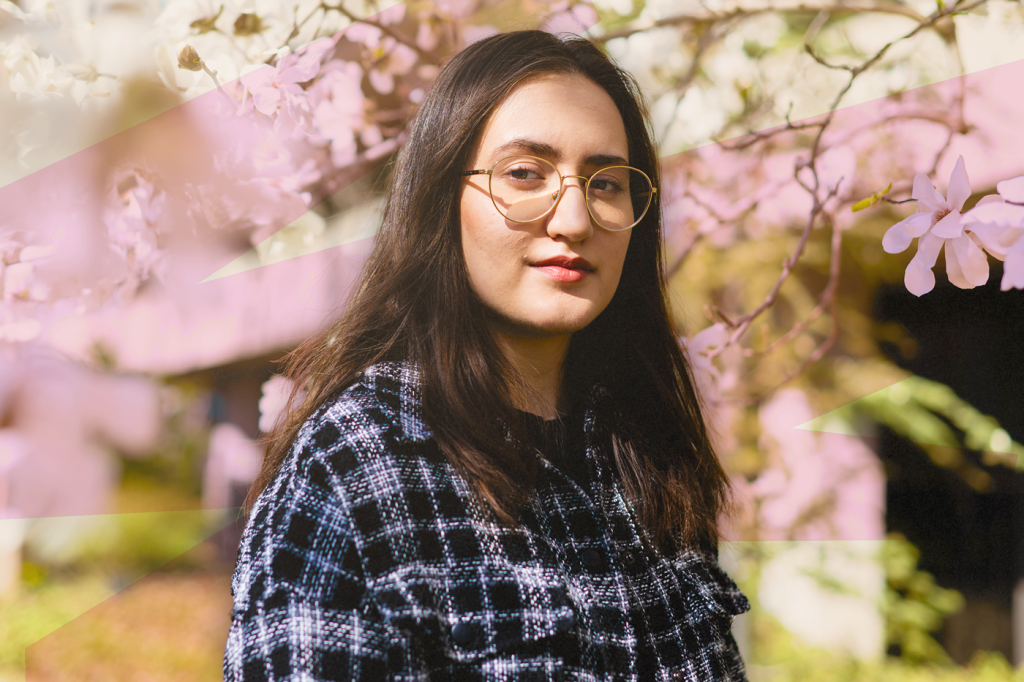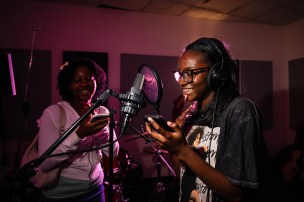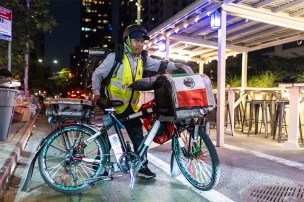Published on
Afghan student’s inspiring journey
Nearly two years since her evacuation from Afghanistan, Khadija Arian is a Northeastern University student, studying finance, learning to audit and heading off to a co-op — all opportunities she wouldn’t have had if she hadn’t fled when the Taliban took over. She has found friends in her new country and plans to stay. “Northeastern is my home away from home,” Arian says.

Khadija Arian’s path to Northeastern University includes a terrifying turning point: the Taliban takeover of her native Afghanistan. She left her homeland in a sudden, harrowing evacuation, the massive August 2021 airlift from the Kabul airport.
Then a student at the American University of Afghanistan, Arian would’ve been in danger had she stayed. Instead, after a rushed goodbye to her parents, she boarded a bus, sat next to a fellow student who would become her best friend, and—guarded by a phalanx of U.S. soldiers—walked from the bus into the airport to board a flight out of the country.
Now, not yet two years later, Arian is living with three other Afghan transfer students in a dorm on Northeastern’s campus. She’s a junior, an accounting and finance major, member of a financial tech club and the university’s Islamic Society.
“Northeastern is my home away from home,” she says.
On a Friday in April, Arian is sitting in the Starbucks in the Curry Student Center, talking about her transition from Afghanistan to campus life at Northeastern. Arian, 21, wears round, gold-framed glasses. Her long dark brown hair is unpinned. It’s one of Boston’s first halfway-warm days of the year, and she’s wearing a stylish black-and-white plaid overcoat, bought at Zara on Boston’s Newbury Street.
The contrast couldn’t be starker between the life ahead of Arian at Northeastern and beyond, including a hoped-for finance career in the U.S., and what was in store for her under Taliban rule, had she not boarded that plane.
“There isn’t anything that I could do back in Afghanistan,” Arian says. “I wouldn’t have a career. Girls in Afghanistan can’t even go to school, let alone university, let alone work. It’s just too many restrictions on how you live, what you do.”
Father stressed learning English
Arian’s path to Northeastern—or at least to study in the U.S.—began in 2013, when her father, an employee of the Afghan Ministry of Education in the former U.S.-backed government, enrolled her in an international high school in Kabul. “He was a big advocate for girls’ education and schools and female teachers,” Arian says.
Her school, the Barakat International School, taught most classes in English and prepared students for overseas admissions exams. Arian, whose first language is Dari, spent six years there, honing her English skills. “I think because my dad was working with a lot of foreigners, he wanted me to learn in English, because he knew the value that it would bring,” she says.
Arian took the SATs, hoping to go to college in the U.S. But a year before her high school graduation, her parents said no. “You can go abroad for your master’s, but for undergrad, you’re just too young,” she recalls them saying. Her parents were concerned that other Afghans—even before the Taliban takeover—might judge her for going overseas at 18, because of their conservative opinions about the role of girls and women. “The problem was not the admission, not the visa, not traveling, but how society viewed the notion of a girl leaving the country alone.”
So in August 2019, Arian enrolled at the American University of Afghanistan, founded in 2006 and funded in part by the U.S. government. She chose business administration from among the four majors offered.
Attending the university was risky during Afghanistan’s civil war. The campus, a target for attacks in Kabul because of its American affiliation, stood behind tall walls and guard towers. Arian and other commuter students had to show identification to a camera before the heavy metal doors to campus would open. The commute was dangerous too. “In Afghanistan, sometimes we say, ‘It’s a miracle that we’re still alive,’ because explosions would happen anywhere,” she recalls. Then came COVID-19, and more than a year of classes on Zoom.
Escaping Taliban takeover
But in summer 2021—just as Arian and other students at the university prepared to return to in-person classes—the U.S. began its final troop withdrawal from Afghanistan. A Taliban offensive, launched in May, swept through much of the country. On Aug. 15, the Taliban entered Kabul, the capital.
Arian took refuge at her uncle’s house. The American University of Afghanistan began sending urgent messages.
“We received an email saying that, firstly, we have to destroy any documents that linked us to the American university, because when the Taliban first came, they started house searches,” Arian says. “And the second thing was, the university said that we’re planning an evacuation, so be ready and have your bags packed.”
She called her parents with the news. At home, her father packed some of her clothes into a suitcase. She would travel light: the university had told students to carry only 22 pounds of luggage. “Obviously, my family knew that I couldn’t do anything if I stayed in Afghanistan,” she says. “I told them that I had to leave and they didn’t argue.”
Arian spent only one night with her parents before word came: students should gather at a hotel to be evacuated by plane to Qatar. It meant a quick goodbye. A favorite dumpling dish that her mother was cooking for dinner instead became Arian’s last home-cooked lunch. Looking back, she says, “I would’ve hugged them a bit longer. I would’ve said things to them and just looked at them and looked at our house [longer].”
When Arian walked into the hotel, she saw someone she recognized: Mashal Aziz, a fellow student. They’d met at a meeting of their campus business club a month earlier. They started talking.
“Since that moment, we’ve stayed together,” says Aziz. They sat side by side on the bus to the airport, and on the plane to Qatar. They’re now roommates. “Whenever I was feeling down, or whenever I was afraid of something or someone,” Aziz recalls, Arian would reassure her. “‘It’s OK. It’s fine. We will go through this.’ That’s how Khadija was to me: very supportive and always giving me good energy.”
In Qatar, and then on a U.S. Air Force base in New Jersey, Arian, Aziz, and five other American University of Afghanistan students continued their studies via Zoom as best they could. In New Jersey, that meant attending online classes at 4 a.m. because of the time difference, struggling with weak WiFi not built for remote learning.
“We didn’t have separate rooms. It was just one big room,” Arian recalls. “It just made attending classes harder. I had to sit in the hallway because everyone else would be asleep.”
Then, in January 2022, the seven Afghan students got word that they’d been accepted into U.S. colleges through the New University in Exile Consortium, an organization made up of more than 60 universities in 15 countries. Arian, her friend Aziz, and two other Afghan students went to Northeastern with full scholarships. The other three Afghan students at the base were accepted at Bard College in New York.
Just in time for the spring 2022 semester, Arian moved to Boston to start classes.
Discovering new way of life
The culture shock was strong at first. Arian and her fellow Afghans would look around the MBTA Green Line trains on her commute, not used to seeing everyone around her transfixed by their phones, their ears plugged with AirPods. Northeastern professors shocked them by telling them to call them by their first names (they were used to calling professors Mr. or Miss before their first name). When they went on their first trip to a U.S. shopping mall, in Saugus, they had trouble figuring out the right bus home.
At first they lived at the Westin Copley Place hotel, a mile from campus, where Northeastern had rented several floors to create socially distanced housing during the pandemic. But it wasn’t until fall 2022, when they moved into a campus dorm, that it truly felt like “the whole college experience started,” Arian says. “Just walking around campus, something is happening. There’s either an event, or there’s someone tabling. You see a poster, a flyer. So you feel more connected.”
Arian and the other three Afghan students belong to Northeastern’s Islamic Society, where they’ve met students from Pakistan, India, Turkey, and several Arab and African countries. During the holy month of Ramadan, when Muslims fast during the daytime, the society held iftars—sunset meals—twice a week. “You break your fast together and then you pray together,” she says. “I think that’s a highlight of Northeastern’s community.”
Meanwhile, Arian is completing her accounting and finance major, a natural evolution from her business administration studies in Kabul. Her favorite Northeastern class so far has been an international finance class—an interesting contrast after taking several Northeastern classes on U.S. finance. “This one, you look into other countries, what they’re doing, and how they’re doing it differently.”
She’s part of a financial technology club, Disrupt: The FinTech Initiative. She works 12 hours a week in Northeastern’s audit department, assisting the senior auditors. “I feel more connected to Northeastern through that,” she says. “I’ve learned a lot about how the university runs and what they do.” That experience helped Arian land a six-month co-op job for this coming summer and fall, with Fidelity’s capital markets trading team in Boston.
Arian and the other three Afghan transfer students share a two-bedroom apartment in West Village B. “We speak in Dari all the time,” she says. “It’s so different to have someone that you can speak in your own language, as opposed to your second language, because you can express your emotions much better.” They cook Afghan food together, mostly relying on Indian grocery stores for spices similar to home. “There’s also this one store that has Afghan bread,” she says. It’s a 15-minute walk from West Village. “But they don’t have it all the time. You get lucky.”
Though Arian has made some friends through classes and extracurriculars, she still spends most of her time with her roommates, especially Aziz. “We really have a very strong bond,” Aziz says. “Sometimes people call us ‘like twins’ because we look like each other. [They ask,] ‘Are you guys sisters?’” Arian and Aziz have a passing resemblance, in their hair color and eyebrows. “I think it’s also the fact that we kind of have the same energy,” Aziz says, “When we’re together, we’re so fun, so energetic, very on to everything, and always having fun and smiling.”
Their favorite spots in town include the shops on Newbury Street; the Charles River, where they walk and kayak; and Helmand, an Afghan restaurant in Cambridge, where the décor, including Afghan clothing, evokes home.
Since her arrival in Boston, Arian has started to travel within the U.S. This year, Arian and Aziz joined Northeastern’s Alternative Spring Break program. In Seattle, they worked with Lifelong, an organization providing nutritious food to HIV patients and elderly people; they prepped meals, chopped vegetables, and packaged the food. Arian has spent some holidays with an uncle in Virginia, and she and Aziz visited Maine with a friend of Aziz’s father. But sometimes Arian just stays on campus during break. “Northeastern is where I am basically all the time,” she says.
Arian’s parents and brother are still in Kabul. On a recent call home, Arian says, her mother recalled the family’s decision to have her stay in Afghanistan for undergrad, before the Taliban takeover. “My mom [told] me, ‘I was so sad when we couldn’t let you go at that time.’” Then she recalled her husband’s supportive gesture, just before Arian left the country: “‘Your father, he packed your bag for you.’ Because he just knew that there wasn’t any—he knew how the situation would go for girls.
“The good thing is, I don’t have a younger sister,” she says—just a younger brother. “So he can go to school. That’s fine for him. But if [I had] a younger sister, then it would be harder, because girls can’t go.”
Arian plans to continue living with her friends, two of whom are graduating this spring, but staying at Northeastern for master’s programs. That’s her plan too, after she gets her bachelor’s in spring 2024. “I’m looking forward to becoming a double Husky,” she says.
After she gets a master’s in finance from Northeastern, Arian plans to make a living in the U.S. financial industry. She won’t go home.
Erick Trickey is a Northeastern Global News Magazine senior writer. Email him at e.trickey@northeastern.edu. Follow him on Twitter @ErickTrickey.





